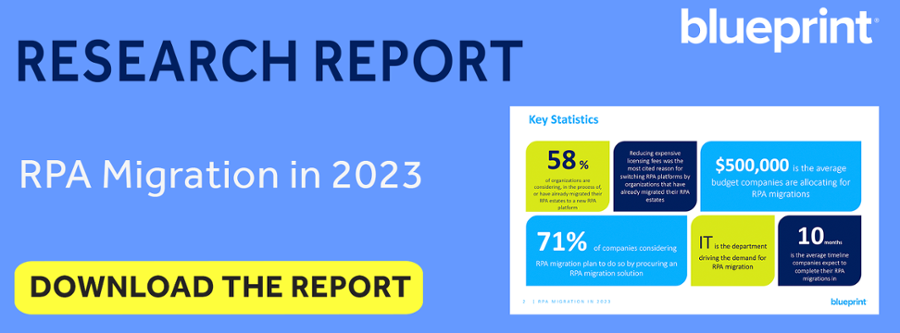5 RPA Migration Trends in 2023
Every year, Blueprint performs market research in conjunction with—a global market research company—to better understand enterprises’ RPA (robotic process automation) needs. The last couple of iterations have seen a heavy focus on RPA migrations because of the rate organizations are switching RPA platforms.
While the final published report is now available, we wanted to provide a sneak peek at the most compelling and interesting trends that the research revealed. Here are the 5 RPA migration trends that Blueprint’s research uncovered in 2023.
#1 – 58% of organizations are considering, in the process of, or have already migrated their RPA estates to a new RPA platform
One of the main objectives of the research that Blueprint performs is to gauge and cross-reference the interest we see in the field for RPA migration with a wider sample size. The results of Blueprint’s research in 2023 were exactly what we expected.
Out of the 500 respondents surveyed, 58% reported that they were considering, in the process of, or had already moved their RPA estates onto a new RPA platform. These findings confirm that there is a real and growing interest for organizations to find more cost-effective and powerful alternatives to the expensive and legacy tech they started their automation journeys on.
It's also interesting to note that of the 48% of organizations that claimed they were not interested in switching RPA platforms, 85% of them were from organizations with over 5,000 employees. This suggests a number of things. First off, a deterrent to RPA migration could be organization size as major initiatives at enterprises are difficult to gain executive buy-in and manage while ensuring continuity. It might also suggest that larger organizations are simply building net-new automations on newly procured RPA platforms instead of migrating entire estates.
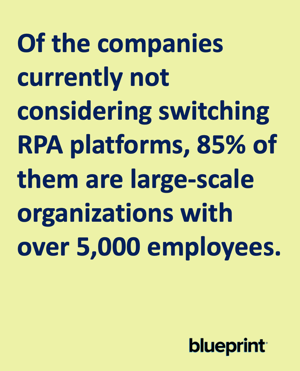
#2 - Reducing expensive licensing fees was the most cited reason for switching RPA platforms by organizations that have already migrated their RPA estates
Another major objective of Blueprint’s research on RPA migration is to ascertain why organizations are interested in migrating their automations estates onto new tools. Interestingly, a new trend emerged in 2023 when compared to 2022’s data.
In 2022, organizations cited leveraging better features and capabilities as the reason they migrated their RPA estates onto new tools. Reducing expensive licensing fees was only the fifth most reported reason driving switches.
In 2023, reducing licensing fees shot its way up to the most reported reason organizations already switched RPA tools and there’s a good reason for that. The leading legacy RPA tools have increased their licensing fees this year to boost decreasing revenue. With a contracting economy at the same time, it’s only served to exacerbate RPA migrations as organizations look to reduce the total cost of ownership for automation with more cost-effective RPA platforms like Microsoft Power Automate.
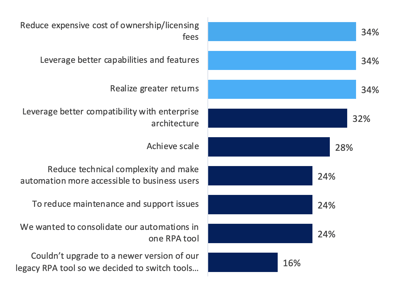
#3 - $500,000 is the average budget companies are allocating for RPA migrations
As 2022’s research on RPA migration that Blueprint performed showed, organizations are budgeting for RPA migration. The significant investment in migrating entire RPA estates to new automation platforms suggests that organizations are keenly aware that an initial outlay is needed in order to realize the eventual and exponential cost reduction, better feature sets, and decreased complexity that comes with migrating to a next-generation intelligent automation platform.
In 2023, organizations currently considering RPA migration planned to set aside $500,000 to complete their switch, partly because they anticipate procuring purpose-built technology to complete their moves, leading us to the next major trend.
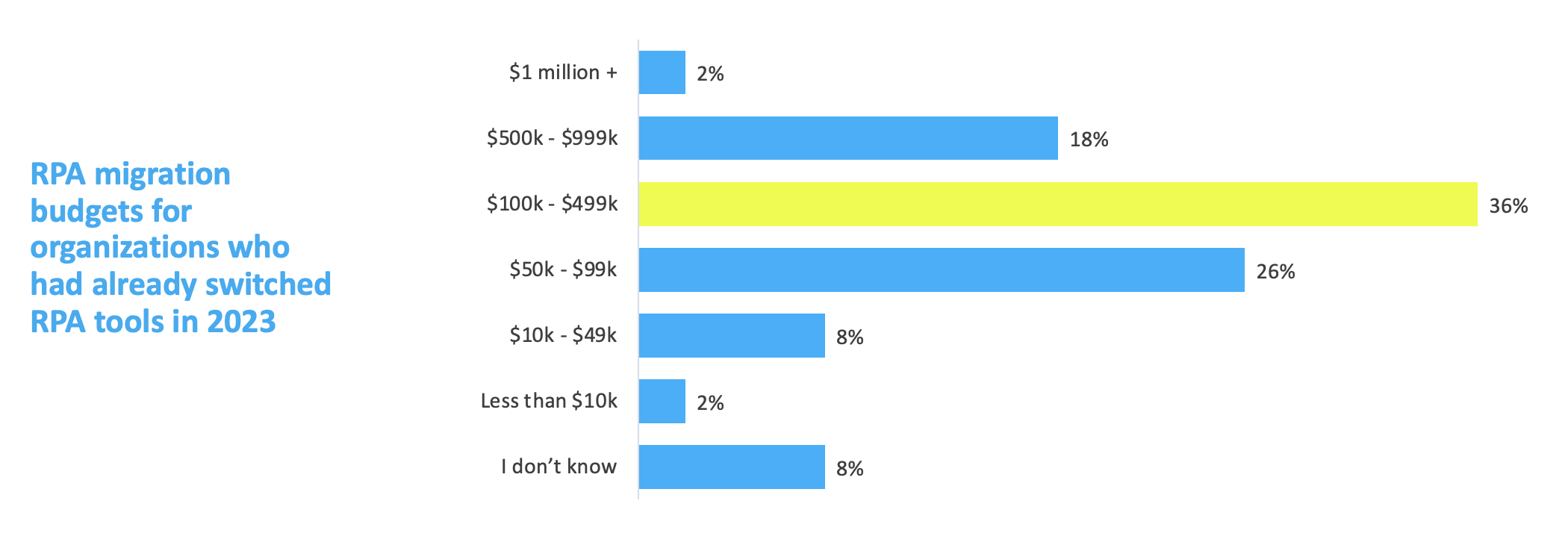
#4 - 71% of companies considering RPA migration plan to do so by procuring an RPA migration solution
Traditionally, one of the biggest challenges to RPA migrations was the fact that organizations and the service integrators they partner with had to execute them manually. They had to investigate each automation, understand what it did, and then recode it so it could be compatible with the destination RPA migration tool.
Now, there are purpose-built RPA migration solutions like Blueprint that make that challenge a thing of the past. So much so that most organizations considering RPA migration – 71% to be exact – plan to perform their switch by procuring an RPA migration solution that will accelerate their move and more importantly, reduce the effort needed for migration and costs because the majority of the work is done for you with technology.
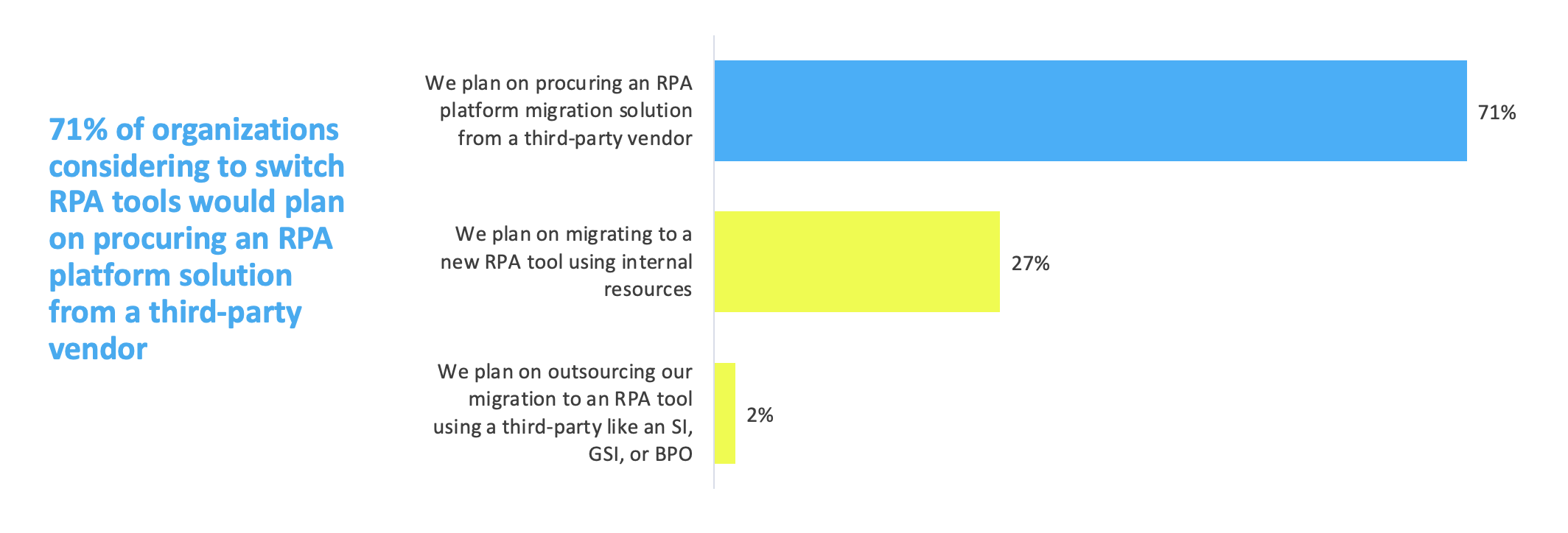
#5 – Executive leadership is a major sponsor for RPA migrations
One of the most interesting trends to emerge from Blueprint’s 2023 research on RPA migration was the active role the executive leadership is taking as sponsors for RPA migration.
For the organizations that already switched RPA platforms, 26% reported that the executive leadership was the main sponsor for the initiative. While IT and Finance & Accounting remain prominent sponsors – continuing trends that emerged in 2022 – the C-suite took the top spot as the purse holders for RPA migration projects.
The logical speculation around this shift is that the threat of a recession and the forced cost reduction that comes with it has compelled executives to ask their direct reports to look for more cost-effective RPA platforms like Microsoft Power Automate in an attempt to get ahead of an unstable economy as legacy RPA vendors raise their licensing fees.
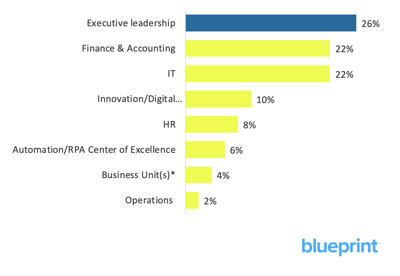
These were simply a snippet of some of the trends that Blueprint’s 2023 research on RPA migrations revealed. Download your very own copy of the report to see all the trends and insight the research has to offer so you can make better decisions about your RPA migration journey.
Share this
Recent Stories

The Top 4 Reasons Organizations Are Opting for RPA Migrations in 2023

The Top 7 RPA Trends of 2023


